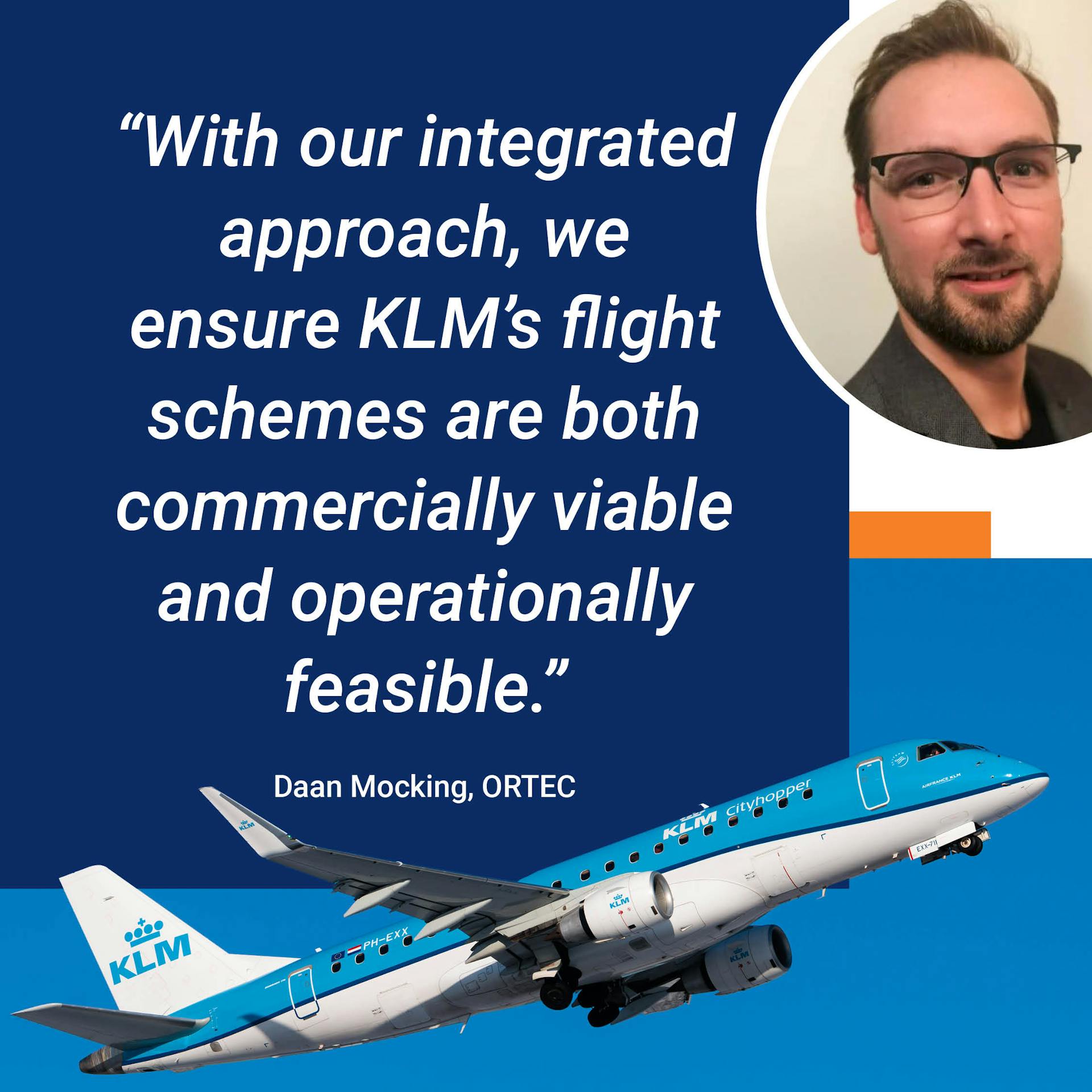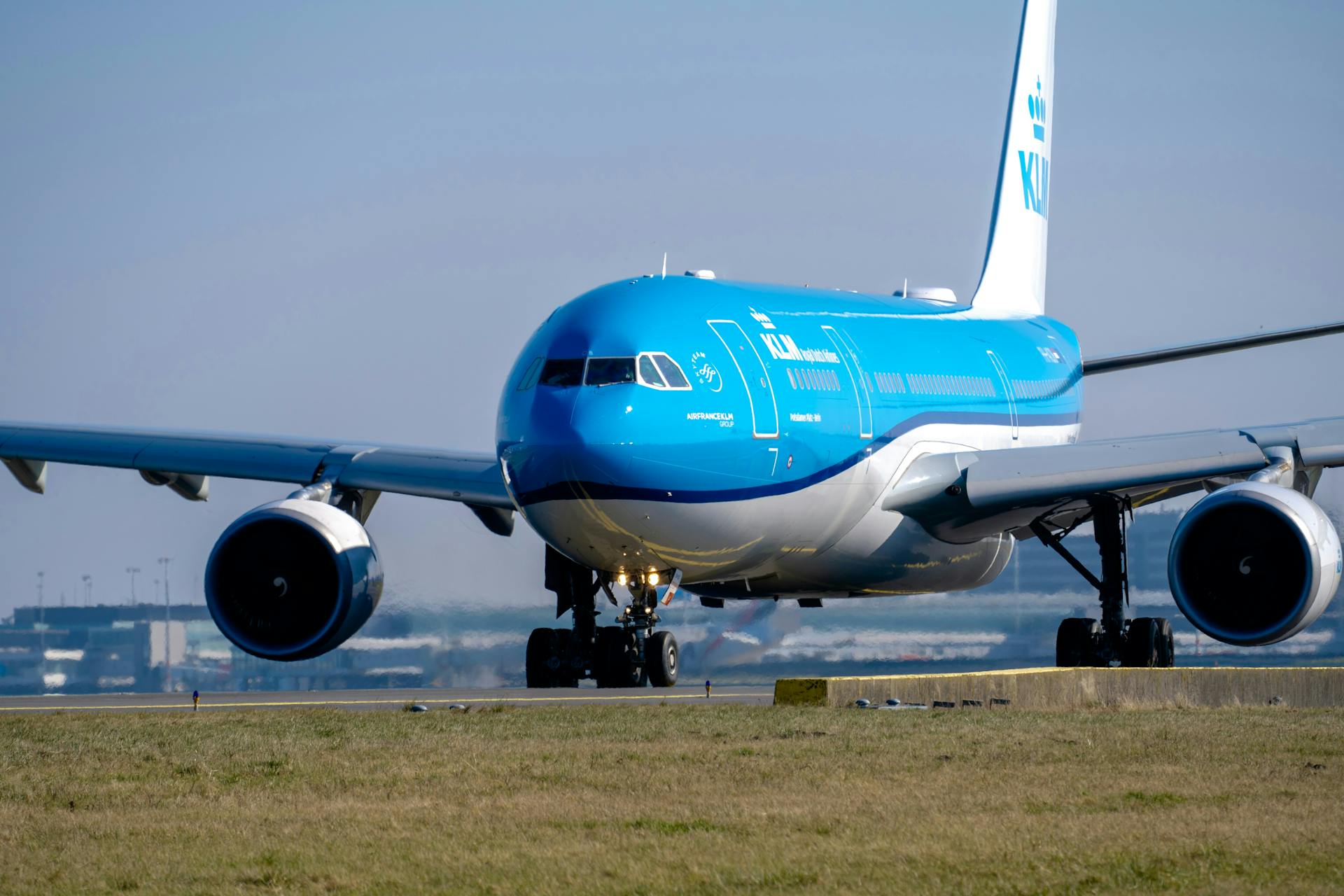How KLM Uses Data Science for More Efficient Flight Schedules
In January 2023, KLM, in collaboration with ORTEC, established a new Data Science team within the Integral Planning & Control (IP&C) department. This team uses statistical models to convert historical data into actionable insights that enhance IP&C’s planning tools. One of the team’s key projects is Flint, a tool that can predict flight punctuality up to six months before departure. This helps planners make the most of buffer times within the schedule, minimizing disruptions and improving the robustness of the roster. The team is also working on a project focused on predicting fuel consumption - a factor closely tied to flight performance. By estimating fuel usage more accurately, tight schedules and last-minute changes can be avoided, which supports lower CO₂ emissions and cost savings.
Daan Mocking, Data Scientist at ORTEC, works with KLM’s Data Science team on optimizing the planning process. “We want to make sure that planners understand what the model is saying -and why it’s saying it.”

From Supporting Dashboards to Leading Predictive Analytics
How did you get started at KLM, and what is your current role?
“I initially joined KLM to support the team responsible for dashboards and data analysis. We analyze historical data to understand what has happened and use those insights to forecast future outcomes. I started mentoring junior data scientists who wanted to specialize in data science. KLM was looking for someone who could guide them and help apply more advanced techniques.”
What do you see as the biggest advancement in predictive modeling in recent years?
“When I started, the focus was mainly on analyzing what had happened and its consequences. Now, the focus has shifted to predictive and prescriptive models. We’re not only able to forecast what might happen - we can also offer recommendations on actions to take to influence specific outcomes. What I find interesting is that you don’t always need cutting-edge technologies to generate value. Even traditional machine learning techniques can make a significant impact.”

Daan Mocking, Data Scientist at ORTEC
"Our data analysis helps create realistic plans proactively, reducing the need for revisions and enabling smoother planning overall."
Enabling Proactive Flight Planning
What does your team do at KLM?
“Our team focuses on improving KLM’s planning process. KLM creates its seasonal flight schedules - either winter or summer - about six months in advance. These schedules are continuously optimized because every department, from commercial to ground operations, has its own priorities.”
Mocking explains that seasonal aviation planning involves several steps. “The commercial department determines which destinations will be offered and how frequently. Next, the planning department sets departure and landing times, and ground operations checks whether there is enough staff available. If any issues arise, the schedule must be sent back to a previous step. That takes up time and effort. Our data analysis helps create realistic plans proactively, reducing the need for revisions and enabling smoother planning overall.”
To support this planning, the team developed Flint. “Flint is a tool that forecasts flight punctuality up to six months before departure. This allows planners to make optimal use of the available margins in the schedule and improve the robustness of the roster. The value of the tool isn’t just in its prediction accuracy - it’s also in its use of explainable AI and the ability to communicate uncertainty around the forecasts. We want planners to understand what the model is doing and why.”
We can predict flight punctuality up to six months before departure. This minimizes disruptions and supports a more efficient operation.
Modeling Fuel Use for Cost and Environmental Impact
However, the team’s work extends beyond punctuality. “Right now, we’re also working on a project to predict fuel consumption. Fuel usage is closely linked to flight performance. Flights with tight schedules tend to speed up when disruptions occur, in an effort to make up for lost time. This leads to higher fuel consumption and increased CO₂ emissions. By estimating the necessary fuel more accurately and identifying which schedules are most efficient, we can reduce both emissions and operational costs. That benefits the business as well as the environment.”
Aligning Commercial and Operational Teams
How do you collaborate with other departments at KLM?
“It’s essential to involve all stakeholders from the beginning and be transparent about what you’re doing. For instance, the tool we developed gives planners insight into how different scenarios impact other departments. That’s why we work closely not only with the planning department, but also with commercial and operational teams. The goal is an integrated planning approach—so that decisions made by one department don’t negatively affect the organization as a whole.”
This approach comes with its share of challenges, says Mocking. “The biggest challenge is finding the right balance between robustness and efficiency. You don’t want to add too much buffer because then you’re not utilizing your resources efficiently. But if the schedule is too tight, even small disruptions can affect the entire operation. We aim to provide planners with accurate data so they can make better-informed decisions. The goal is to create schedules that work in practice, with fewer last-minute adjustments.”

What’s Next: Predicting Costs and Tracking More KPIs
What are the next steps for the team?
“We’re looking to expand our ability to forecast the operational cost impact of flights. Planners want to know not just whether a flight will depart on time, but also how changes in the schedule will affect fuel costs. If we can predict how much fuel is needed across different scenarios, we can support better decisions. That kind of insight is extremely valuable, especially when you consider the cost implications of inefficient planning. We also want to provide visibility into other key performance indicators, such as so-called ‘non-performance costs.’ These include expenses related to passengers missing connections or being rebooked - like compensation, new tickets, meals, and hotel stays.”
💡 What Can Other Companies Learn from This?
According to Mocking, other companies or industries can also learn from KLM’s approach. He shares a few tips: “The main takeaway is to start small. Companies often want to go big from the start and launch large-scale projects, but it’s better to first gain experience through small, well-defined initiatives. We also started with a pilot project that used data to predict how a certain flight schedule would perform in practice. From there, we could expand. It’s important to first understand the bottlenecks before making major changes. That said, you should still have a clear long-term vision guiding your pilot. It needs to be connected to where you ultimately want to go.”
Don't miss out on our next insights
About Daan Mocking
Daan Mocking has quite a unique career path - starting as a biomedical scientist, then becoming a professional poker player, followed by a move into econometrics and now data science. He has worked in sectors such as financial services, energy, and retail. For the past two years, he’s been focused on predicting flight punctuality and fuel consumption at KLM. Outside of work, you’ll find him hiking in the mountains, bouldering, or dancing salsa.
What motivates you most in your work?
“What I enjoy about this work is the combination of data analysis and the direct impact on operations. We build tools that not only lead to cost savings but also improve satisfaction for customers and employees, while contributing to a more sustainable operation. Knowing that a small team can make a real difference - that’s what drives me every day.”



